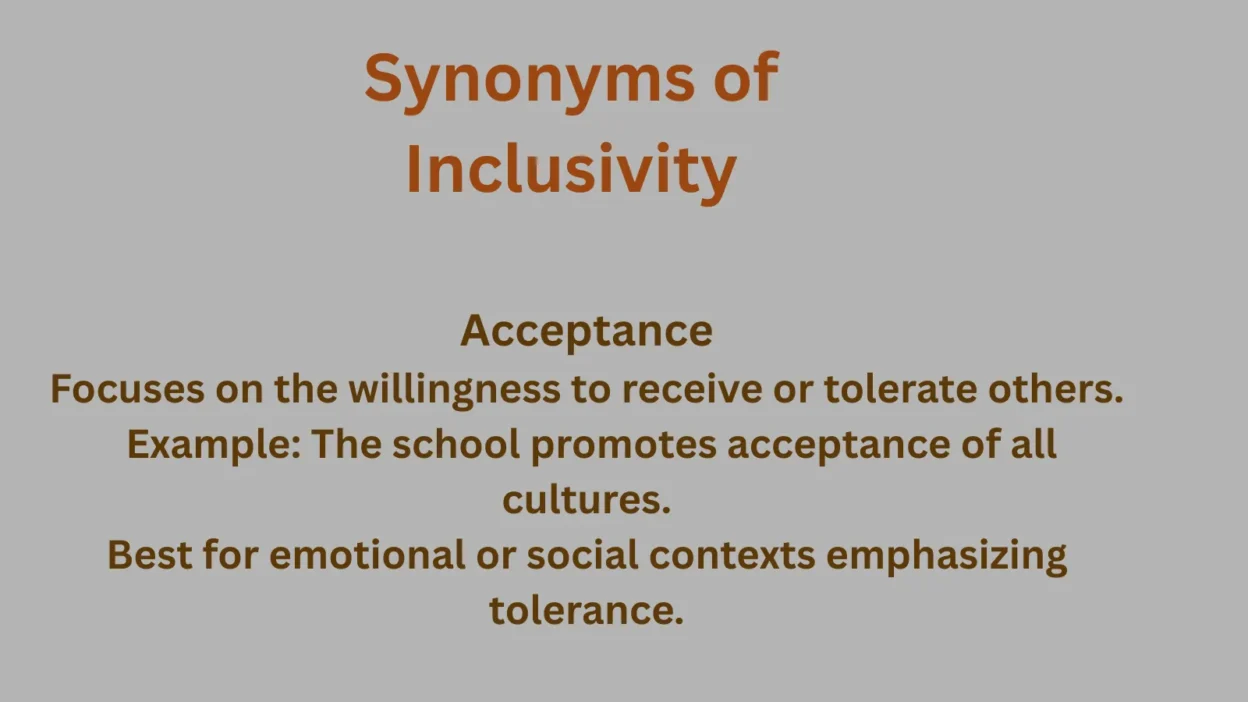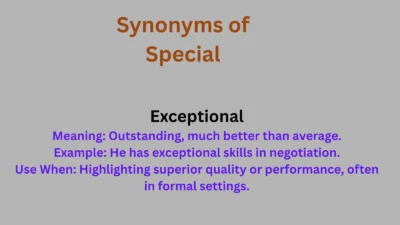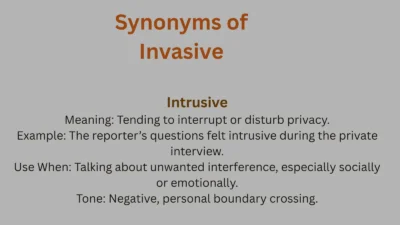Synonyms of Inclusivity help us speak about belonging, unity, and acceptance in fresh and meaningful ways. Whether you’re writing about workplace culture, social justice, or simply aiming for more thoughtful language, the right words can express a spirit of openness and respect. Inclusivity isn’t just a buzzword — it’s a powerful principle rooted in empathy and equality.
Language shapes how we connect, and using inclusive alternatives can foster a more welcoming environment in both speech and writing. By expanding your vocabulary, you also expand your ability to embrace diversity in all its forms.
In this post, we’ll explore alternative words for inclusivity, each with its tone and nuance. From formal to everyday language, you’ll discover how to express inclusion without sounding repetitive. Perfect for writers, educators, and anyone who values words that bring people together.
What Does Inclusivity Mean?
At its core, inclusivity means the practice or policy of including people who might otherwise be excluded or marginalized, such as those from different backgrounds, abilities, or identities. It’s about embracing diversity, creating spaces where everyone feels valued and welcomed.
Unlike traits like modesty or shyness, inclusivity is more about openness, acceptance, and embracing differences. It signals a conscious effort to invite and respect everyone, whether in social settings, workplaces, or communities.
30 Synonyms of Inclusivity and When to Use Them
Here’s a handy list of 30 words that relate to inclusivity, each with a brief description, example sentence, and advice on when to use it.
1. Diversity
Emphasizes a mix of different elements or people.
Example: Our company values diversity in hiring to foster innovation.
Use when focusing on the variety within a group rather than the act of including.
2. Acceptance
Focuses on the willingness to receive or tolerate others.
Example: The school promotes acceptance of all cultures.
Best for emotional or social contexts emphasizing tolerance.
3. Open-mindedness
Refers to a readiness to consider new ideas or people.
Example: Her open-mindedness helped bridge gaps between departments.
Use when highlighting flexibility and willingness to include.
4. Tolerance
Implies enduring differences without necessarily embracing them.
Example: The community showed tolerance toward different lifestyles.
Use in contexts where coexistence is key but full acceptance may not be present.
5. Integration
Focuses on combining parts into a whole.
Example: The integration of international students enriched campus life.
Ideal for formal or structural contexts.
6. Involvement
Means participation or engagement.
Example: Employee involvement in decision-making boosts morale.
Best when emphasizing active inclusion or engagement.
7. Embracing
Suggests warmly accepting or welcoming.
Example: The festival is about embracing all traditions.
Use for a warm, positive tone.
8. Welcoming
Directly highlights the act of making others feel at home.
Example: They created a welcoming environment for new hires.
Great for hospitality or social settings.
9. Unity
Conveys a sense of togetherness or oneness.
Example: The rally was a call for unity across communities.
Use when emphasizing harmony among diverse groups.
10. Equity
Focuses on fairness and justice in treatment and access.
Example: The school implements equity to support all students fairly.
Ideal in legal, educational, or policy discussions.
11. Accessibility
Emphasizes making spaces or resources available to all.
Example: The new building has increased accessibility for wheelchair users.
Use for physical or digital inclusion contexts.
12. Broad-mindedness
Similar to open-mindedness but slightly more formal.
Example: His broad-mindedness helped resolve conflicts.
Good for intellectual or diplomatic settings.
13. Multiculturalism
Focuses on the coexistence of multiple cultures.
Example: Multiculturalism is celebrated in this city’s festivals.
Best for cultural or societal discussions.
14. Collaboration
Means working together inclusively toward a goal.
Example: Collaboration among departments improved project outcomes.
Ideal in teamwork or business contexts.
15. Community
Connotes a group with shared values or interests.
Example: The community center promotes inclusivity through events.
Use when emphasizing belonging.
16. Hospitality
Focuses on a friendly and generous reception.
Example: Their hospitality made guests feel comfortable.
Good for social or travel contexts.
17. Inclusiveness
Almost a direct synonym, it emphasizes the quality of being inclusive.
Example: The inclusiveness of the policy ensures no one is left out.
Use when describing policies or attitudes.
18. Open-heartedness
Suggests kindness and generosity in accepting others.
Example: Her open-heartedness made everyone feel accepted.
Use for warm, emotional contexts.
19. Receptiveness
Means being willing to receive ideas or people.
Example: His receptiveness to feedback improved team dynamics.
Use when emphasizing willingness.
20. Integrationism
Philosophy promoting social integration.
Example: Integrationism supports blending diverse groups into society.
Formal use in social sciences.
21. Acceptance
Focuses on acknowledgment and approval.
Example: Acceptance of differences is key to harmony.
Often, emotional or social contexts.
22. Congeniality
Refers to being pleasant and agreeable to others.
Example: The team’s congeniality fostered inclusiveness.
Good for describing interpersonal warmth.
23. Togetherness
Focuses on emotional or physical closeness.
Example: Family dinners promote a sense of togetherness.
Use when emphasizing emotional bonds.
24. Pluralism
Recognizes the coexistence of diverse groups.
Example: Political pluralism encourages multiple viewpoints.
Use in political or philosophical contexts.
25. Participation
Emphasizes active involvement.
Example: Student participation in clubs encourages inclusivity.
Best for action-oriented contexts.
26. Sympathy
Means sharing feelings and showing understanding.
Example: Her sympathy created a supportive space.
Emotional context, less formal.
27. Altruism
Focuses on selfless concern for others.
Example: Altruism drives inclusive community work.
Use when emphasizing kindness and generosity.
28. Humanity
Refers to humaneness and compassion.
Example: Acts of humanity reflect inclusivity in society.
Use for broad ethical or moral discussions.
29. Open-door policy
Metaphor for welcoming and an accessible approach.
Example: The manager’s open-door policy encouraged inclusivity.
Business or organizational context.
30. Fairness
Emphasizes impartial and just treatment.
Example: Fairness in the workplace promotes inclusivity.
Use when discussing equality and justice.
How to Choose the Right Synonym
Choosing the perfect word depends on your context, tone, and emotional nuance:
- Formal vs. Informal: Use words like integration or pluralism for formal writing; choose welcoming or open-heartedness for informal, friendly tones.
- Emotional warmth: If you want warmth and kindness, opt for embracing, sympathy, or hospitality.
- Focus on fairness or policy: Use equity, fairness, or inclusiveness.
- Active participation: Choose involvement, participation, or collaboration.
- Cultural context: For multicultural or societal diversity, go with multiculturalism or pluralism.
- Tolerance vs. Acceptance: Tolerance can feel more passive, while acceptance is warmer and more positive.
Cultural and Emotional Contexts to Consider
Some synonyms carry cultural or emotional weight that affects their appropriateness:
- Tolerance can imply begrudging acceptance, which might not be ideal if you want to emphasize the celebration of differences.
- Altruism and humanity highlight ethical or moral dimensions and work well in inspirational writing.
- Pluralism and integrationism are often used in political or sociological discourse.
- Words like welcoming or hospitality evoke a personal, interpersonal warmth suitable for social contexts.
Conclusion: Mastering the Art of Synonym Selection for Inclusivity
Inclusivity is a nuanced and rich concept that deserves equally nuanced expression. Whether you want to highlight fairness, warmth, participation, or diversity, there’s a synonym that fits your message perfectly.
By understanding the subtle differences in tone, context, and emotional weight of each synonym, you can communicate your ideas with clarity and empathy.
So next time you write or speak about inclusivity, choose your words thoughtfully and watch your message resonate more deeply with your audience.




